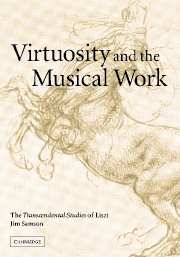4 - Making and remaking
Published online by Cambridge University Press: 22 September 2009
Summary
MUTUAL DEDICATIONS
The strengthening work orientation of musical culture in the second half of the nineteenth century has been characterised by William Weber in the terms of an ‘authoritarian canon’. Recent commentators have been anxious to highlight this dimension of the Western canon, representing it as an instrument of exclusion, a means of legitimating and reinforcing the identities and values of those who exercise cultural power. The most blatant challenges have issued from Marxist, feminist and post-colonial approaches to art, where it is argued that class, gender and race have been factors in the inclusion of some figures and the marginalisation of others. But it is hard to deny that the construction of ‘mainstream’ traditions – as much to do with chauvinist politics as with art – has also coloured our view of certain national repertories, to say nothing of music from some of those ‘peripheral’ cultures gathered around the edges of Europe. Compared to such exclusions, especially when they are depicted in the aggressive primary colours of a politicised radical criticism, the sidelining of ‘virtuoso music’ from the mid-nineteenth century onwards may seem a matter of mezzotints. Yet it offers us at least part of the explanation not only for the comparative neglect of Alkan, Busoni and the virtuoso tradition generally, but also for a certain ambivalence in Liszt's status, even today.
- Type
- Chapter
- Information
- Virtuosity and the Musical WorkThe Transcendental Studies of Liszt, pp. 103 - 133Publisher: Cambridge University PressPrint publication year: 2003

